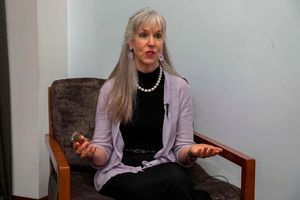Diseases you almost forgot about, thanks to vaccines

World Health Organization Kenya Disease Prevention and Control Officer Joyce Onsongo administers a polio vaccine to a child in Kibera, Nairobi, on May 26, 2021.
What you need to know:
- Vaccines work by helping your body’s immune system to develop a defence against specific disease-causing organisms. This is done so that if and when your body comes across that specific organism, the body’s immune system will quickly identify it and fight against it. This can either prevent the disease completely or prevent severe disease in case you get sick.
- However, a few vaccinated people still get the disease in its severest form, especially if the immune system is weak.
Dear doctor,
Which diseases are prevented by vaccines?
Dear reader,
Infectious diseases are caused by pathogens that may be bacteria, viruses, fungi or parasites. Vaccines are made of killed or weakened pathogens or products of parts of these pathogens or genetically engineered biological products or particles mimicking the pathogens. The vaccine will protect against infection by the specific pathogen and all the diseases the pathogen is capable of causing. These include:
HPV vaccine: Cervical, penile, anal and oropharyngeal cancers; and anogenital warts
Cholera vaccine: Cholera
Covid-19 vaccine: Sars-Cov-2 infection
Diphtheria vaccine: Diphtheria
Ebola vaccine: Ebola
Hepatitis B vaccine: Acute and chronic hepatitis B
Influenza vaccine: Influenza infection
Japanese encephalitis
Malaria vaccine: Malaria
Measles vaccine: Measles infection
Pneumococcal conjugate vaccine: Pneumococcal pneumonia, pneumococcal meningitis
Meningococcal vaccines: Meningococcal Meningitis
Mumps vaccine (part of MMR): ,Mumps parotitis, mumps orchitis
Pertussis: Whooping cough
Polio vaccine: Polio
Rabies vaccine: Rabies
Rotavirus vaccine: Rotavirus diarrhoea
Rubella vaccine (part of MMR): German measles, congenital rubella
Tetanus vaccine: Tetanus
Typhoid vaccine: Typhoid fever
Varicella vaccine: Chicken pox, shingles
Yellow fever vaccine: Yellow fever
Dear Doc
What is the function of a vaccine?
Dear reader,
Vaccines work by helping your body’s immune system to develop a defence against specific disease-causing organisms. This is done so that if and when your body comes across that specific organism, the body’s immune system will quickly identify it and fight against it. This can either prevent the disease completely or prevent severe disease in case you get sick. However, a few vaccinated people still get the disease in its severest form, especially if the immune system is weak.
Vaccines are made to target specific organisms. In some cases, the vaccine may be able to protect against organisms that are closely related to the primary target. For example, cholera vaccine targets the cholera bacteria specifically and it does not protect against any other diseases. The purpose of the cholera vaccine is to help the body’s immune system develop a defense against the Vibriocholerae bacteria so that if the vaccinated person is exposed to these bacteria, the body’s immune system will fight them, preventing any infection, and in case someone gets infected and develops the disease, the vaccine will help reduce the chances of developing severe disease.
Dear doc,
I have actually heard of quite a number of diseases/conditions being blamed on vaccines such as autism. Is this true?
Yvonne
Dear Yvonne,
A vaccine is a biological preparation that is introduced to the body through oral intake or through injection that provides or stimulates the body to provide a protective response against disease-causing organisms or toxins. The preparation may be a part of/or a weakened or killed organism or toxin, or other immunological preparations. Because of this, the vaccine cannot cause that specific disease. However, the purpose of the vaccine is to activate an immune response, which may cause symptoms. In addition, just like any other treatment, there may be side effects or allergic reactions to a vaccine. In a few people, the negative effects may be severe. However, for the majority of individuals, there are mild or no negative effects,and the targeted illness is prevented or its negative effect is much less. Because of this, vaccines have saved millions of lives and contributed to improvement in life expectancy in the last few decades. Vaccines do not cause autism. This myth was generated by scientists who published a paper in 1998 that was later retracted because it was not scientifically sound.
-There have been numerous papers that have been done that show there is no association between any vaccine and autism.
-In some countries, changes were made to vaccines to remove the disputed compound (thimerosal), even though it has been proven not to cause autism. Since this change, the proportion of children diagnosed to have autism has actually significantly gone up. Part of the reason may be greater awareness and higher rates of diagnosis as compared to previous years.
-There is no specific known cause of autism. There is a higher risk of developing autism if there is a close relative who also has the disorder. There is also a higher risk of developing autism if the unborn baby is exposed to thalidomide or to the rubella virus within the first three months of development, but not thereafter. The symptoms of autism become evident in early childhood, around the same time that the children are getting vaccines, which may further fuel they myths. However, it has been proven over and over again that vaccines do not cause autism, but vaccines protect against serious illness and have saved lives.
Dear Doc,
What is Hepatitis? Can it be prevented?
Dear reader,
Hepatitis refers to inflammation of the liver which can occur due to infection with the hepatitis viruses (type A, B, C, D or E), or due to some medications, alcohol, toxins and substance abuse. Hepatitis can also develop as a consequence of another disease. When someone has hepatitis, they may have upper (right) abdominal pain, fever, vomiting, dark urine, light-coloured stools, fatigue and yellowness of the skin and mucus membranes. Sometimes the inflammation of the liver goes on for a long time (chronic hepatitis), in which case the symptoms may not be obvious. Rarely, hepatitis may lead to liver failure, which is potentially fatal. Sometimes hepatitis may also raise the risk of getting liver cancer. The most common cause of hepatitis is viral infection. Hepatitis A and E are spread through contaminated food and water while Hepatitis B, C and D spread through infected body fluids. To diagnose hepatitis, the following tests may be done — physical examination, blood tests, ultrasound scan and liver biopsy.
There is no cure for hepatitis. However, in many instances, it resolves on its own after a short duration. Where there are severe symptoms or chronic infection, there are supportive treatments that may be given. The best way to manage hepatitis is to prevent it by getting vaccinated against hepatitis A and B, observing good water and food hygiene, observing safe sex practices, avoiding direct contact with another person’s blood and other fluids, and avoiding sharing toothbrushes, razors and needles. It is estimated that over 1.5 million Kenyans are infected with Hepatitis B virus and majority are unaware of this. It is prudent for all to be vaccinated against it and especially for those with high risk professions such as health care workers. The Hepatitis B vaccine was incorporated into the Kenya Expanded Programme for Immunization schedule in 2002, allowing for routine vaccination of children.
send your questions to [email protected]




